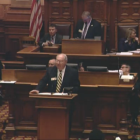

Outgoing Board Chairman Looks at Past, Present and Future of Georgia’s DJJ
|
After more than a decade of service, Georgia Department of Juvenile Justice Board Chairman Ed Risler stepped down from his post earlier this month following the expiration of his term in the summer.Risler outlasted many Ga. DJJ senior staff members, working with five commissioners over the years. He's seen the Department undergo a number of changes -- from federal mandates to the accreditation of the DJJ school system -- and remains optimistic about the future, despite budgetary constraints.A longtime professor at the University of Georgia, Risler is a licensed clinical social worker and marriage and family therapist. His research and teaching focuses on juvenile justice, poverty, international social work and a number of related areas.JJIE caught up with Risler last week to get his take on the past, present and future of the agency charged with overseeing and rehabilitating juveniles offenders throughout the state.
JJIE: You’ve served on the DJJ Board for more than a decade.

Cheating Scandal Prompts New SAT and ACT Security Measures
|
In the wake of an embarrassing cheating scandal involving at least 20 Long Island, N.Y., high school students, the makers of the SAT and ACT college entrance exams are tightening rules nationwide. Significantly, students will now be required to provide a photograph when signing up for the tests that officials will check against student identification on testing day. The SAT and ACT are used by virtually every American college when making admissions decisions. Last fall, the Nassau County District Attorney charged five teenagers with taking the tests for other students and accused 15 others with paying them $500 to $3,600 to take the tests, The New York Times reports. As many as 50 students may have been involved, the district attorney, Kathleen M. Rice, told the Times.

CASA Volunteers Give Children a Voice
|
During the Texas girl’s checkup at the local clinic, the doctor was surprised by what he found. Brittany* had a sexually transmitted disease. She was three. Quickly after that, into Brittany’s life came a host of police officers, some child abuse investigators, a judge, and a public defender. Luckily someone else came along at the same time.

Governor’s Budget Concerns Sunk Georgia Juvenile Code Rewrite but Cost of Not Passing it Could be Higher
|
Budget concerns stalled juvenile justice reform in Georgia this week, as the Georgia Senate declined to take it up in the waning days of the 2012 legislative session. But what about the costs of not passing juvenile justice reform? The proposed 246-page Child Protection and Public Safety Act would have strengthened programs for foster children, established community-based help rather than incarceration for many troubled juveniles and bolstered their legal representation, among many other improvements. Those reforms, which advocates say would save taxpayers money, may now be pushed back at least another year due to questions about the expense associated with other aspects of the bill. The act, for instance, would require that the state help children become independent once they age out of the foster-care system on their 18th birthdays.

Georgia Juvenile Code Rewrite Suffers Last-Minute Death
|
Lingering questions about the state’s cost for prosecutors and public defenders in juvenile courts scuttled the bill Monday at the 11th hour. House Bill 641, an overhaul of Georgia’s juvenile code for deprived, troubled and delinquent children, remained stuck in the Senate Rules Committee and is not scheduled for a vote before the Legislature adjourns Thursday. Rep. Wendell Willard, sponsor of the bill, did not push for a floor vote after hearing that Gov. Nathan Deal still had budget concerns, said Kirsten Widner, policy director at the Barton Child Law and Policy Center. “As best as we can discern, there are enough funding questions about some of the other priorities from the governor’s platform ... that he felt like he needed to make some tough budget decisions, and something had to give,” Widner said. The governor’s office did not have time, Widner said, to reconcile last-minute disputes about the real cost of the reforms.
“There are such wildly different estimates and they didn’t have the time to get to the bottom of all of that, to work through all the numbers and really understand them,” she said.






